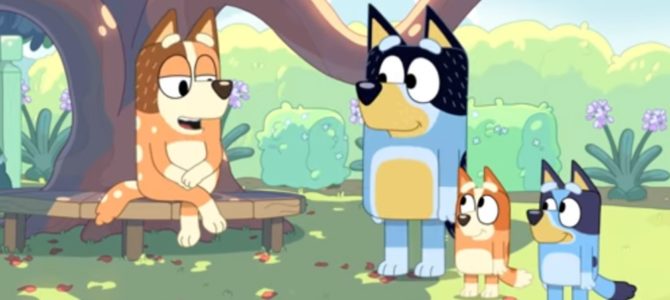
As my wife and I are busy raising a two-year-old and five-month-old, we’ve learned what every parent of toddlers knows about children’s TV: that nearly all kid-targeted programs are annoying, repetitive, and uninspired. Such make-it-stop shows like “Barney,” “Peppa Pig,” “Mickey Mouse Clubhouse,” and “Cocomelon” come to mind.
Australian dad and TV producer Joe Brumm was inspired by his two daughters to create a different kind of show. Each seven-minute episode of “Bluey” usually features six-year-old Bluey and four-year-old Bingo playing an imaginative game, overseen (more or less) by loving married parents Bandit and Chilli.
Foregoing typical kids’ TV tropes of memorizing numbers or highhanded moral lessons, Brumm said his goal was simply to “make a show that makes kids laugh.” At first, it’s not obvious how much thought or care goes into “Bluey”—or that it’s highly autobiographical for Brumm, who engages with his kids much like the show’s daddy dog alter ego.
“The main lightning strike I had (was) watching them play,” he said in an interview. “These games that we’re playing at like five in the morning, and then you never do again, go in some weird directions and I thought could be funny to animate. While I was in the middle of it, I remembered it, wrote it down, and we made episodes about that.”
To produce “Bluey,” Brumm founded a small animation studio in Brisbane, Australia—a mostly suburban area with essentially no entertainment industry—and brought together a team of animators, many also young parents. Three years and 120 episodes later, including a distribution deal with Disney, it has taken the world by storm.
It’s counterintuitive to consider lessons from a show setting out not to teach (keep in mind: Fred Rogers was famously against commercialism, yet his life’s work lives on in books.) Yet there’s more going on in the world of “Bluey” than meets the eye, and not all of it seems helpful. Many lessons are perceptive, while a few my wife and I cast aside.
1. Let Kids Solve Their Small Conflicts (S1, Ep. 10 “Hotel”)
With plenty of laughs and idiosyncratic kid lines that feel real, “Hotel” encapsulates what families will enjoy in most episodes. Except, a few minutes in, as his daughters clash about how their game will proceed, one storms off.
Rather than rush to get them face-to-face and resolve their issues, dad Bandit goes back to his tasks at hand. He leaves it to the older one to realize what caused the breakdown and make things right, so they can finish their game.
2. Teach by Example (S1, Ep. 47 “Neighbours”)
In a clever bit of commentary on society, the family uses sofa cushions to set up a neighborhood of four separate households. The younger sibling keeps encroaching on the older’s property line.
Getting into the game’s spirit, the parents have their own HOA disagreement as dad amps up his music without regard for others. As the adults find a way to resolve their issue, the kids observe and also work through their skirmish.
Ignore: It’s OK to Disrespect Parents (S1, Ep. 45 “Kids”)
Bandit’s willingness to play at a child’s level, from tea parties to acting as a zoo animal, gets lauded by many as #DadGoals. I agree—to a point. In a few episodes, the reversal of parent-child roles veers into Nickelodeon-style disregard for authority.
His daughters decide to take over grocery shopping, and treat their dad as a toddler. Similar scenarios play out elsewhere, with humiliating fathers an unintended consequence. Perhaps every family’s personality is a bit different, but flagrant disrespect doesn’t fly here.
3. Boring Things Are Important (S1, Ep. 22 “The Pool”)
Celebrating the crucial role of organized, list-making moms, this one might be my wife’s favorite. Dad takes the kids to the pool, but he neglects to bring several essentials, leading to sunburn and general upset. Thankfully, mom arrives to save the day.
4. Failure and Struggle Are Part of Life (S1, Ep. 11 “Bike”)
This episode in particular reveals how “Bluey” isn’t typical in its approach. “The show was to make kids laugh,” says Brumm. “But it slowly moved towards trying to look at what I’d learned in my life since I’d been a parent and what had changed from my previous life. I tried to get to the bottom of those things, and then put that on-screen.”
At a park, three young canine kids are struggling with various obstacles, such as one failing to get on the monkey bars. The snap reaction from big-kid Bluey is to lend a hand to end their striving. But dad says, “Just watch”—a wise word about empowering others.
Ignore: It’s OK for Kids to Be A Terror (S2, Ep. 11 “Charades”)
Bluey’s family has a cousin named Muffin who throws tantrums and really needs better home training. Yes, my kids have made scenes in restaurants, and I’m never one to judge another parent’s situation when that happens.
The problem is in how “Bluey” seems to excuse this child’s consistent antics, as Muffin learns about cooperation only to later revert to chaos. Perhaps the intent is to reflect real life, because everyone has encountered undisciplined kids; but mostly it makes parents skip past those infrequent Muffin-related episodes.
5. Always Go for the Laugh (S1, Ep. 6 “The Weekend”)
What elevates this show are the kids’ natural dialogue and parents’ commitment to play along with outrageous games. (Brumm and his team actually keep secret the specifics of who voices kid characters, saying only that it’s a mix of everyday kids and some with acting experience.)
“Bluey” engages emotions—certainly laughter, but also tears. Brumm says he has read scores of email and tweets, including from “some of his mates who are tough guys,” that tell of getting misty-eyed after an episode wholly captured life with young kids.
“It’s a compliment for the show,” said the writer-creator. “But you’re never really far from crying once you’ve had kids! You’re crying because you love your kids, and because you’re tired. It is something special (and) totally emotional territory when you’ve got kids that age.”
The first two seasons of “Bluey” are available in the U.S. on Disney Plus.









